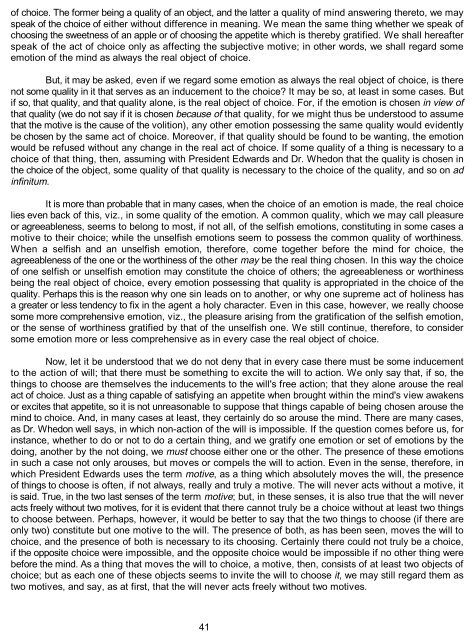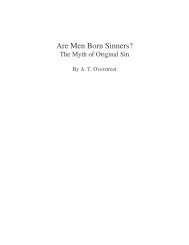Foreknowledge by Joel Hayes - Library of Theology
Foreknowledge by Joel Hayes - Library of Theology
Foreknowledge by Joel Hayes - Library of Theology
Create successful ePaper yourself
Turn your PDF publications into a flip-book with our unique Google optimized e-Paper software.
<strong>of</strong> choice. The former being a quality <strong>of</strong> an object, and the latter a quality <strong>of</strong> mind answering thereto, we may<br />
speak <strong>of</strong> the choice <strong>of</strong> either without difference in meaning. We mean the same thing whether we speak <strong>of</strong><br />
choosing the sweetness <strong>of</strong> an apple or <strong>of</strong> choosing the appetite which is there<strong>by</strong> gratified. We shall hereafter<br />
speak <strong>of</strong> the act <strong>of</strong> choice only as affecting the subjective motive; in other words, we shall regard some<br />
emotion <strong>of</strong> the mind as always the real object <strong>of</strong> choice.<br />
But, it may be asked, even if we regard some emotion as always the real object <strong>of</strong> choice, is there<br />
not some quality in it that serves as an inducement to the choice? It may be so, at least in some cases. But<br />
if so, that quality, and that quality alone, is the real object <strong>of</strong> choice. For, if the emotion is chosen in view <strong>of</strong><br />
that quality (we do not say if it is chosen because <strong>of</strong> that quality, for we might thus be understood to assume<br />
that the motive is the cause <strong>of</strong> the volition), any other emotion possessing the same quality would evidently<br />
be chosen <strong>by</strong> the same act <strong>of</strong> choice. Moreover, if that quality should be found to be wanting, the emotion<br />
would be refused without any change in the real act <strong>of</strong> choice. If some quality <strong>of</strong> a thing is necessary to a<br />
choice <strong>of</strong> that thing, then, assuming with President Edwards and Dr. Whedon that the quality is chosen in<br />
the choice <strong>of</strong> the object, some quality <strong>of</strong> that quality is necessary to the choice <strong>of</strong> the quality, and so on ad<br />
infinitum.<br />
It is more than probable that in many cases, when the choice <strong>of</strong> an emotion is made, the real choice<br />
lies even back <strong>of</strong> this, viz., in some quality <strong>of</strong> the emotion. A common quality, which we may call pleasure<br />
or agreeableness, seems to belong to most, if not all, <strong>of</strong> the selfish emotions, constituting in some cases a<br />
motive to their choice; while the unselfish emotions seem to possess the common quality <strong>of</strong> worthiness.<br />
When a selfish and an unselfish emotion, therefore, come together before the mind for choice, the<br />
agreeableness <strong>of</strong> the one or the worthiness <strong>of</strong> the other may be the real thing chosen. In this way the choice<br />
<strong>of</strong> one selfish or unselfish emotion may constitute the choice <strong>of</strong> others; the agreeableness or worthiness<br />
being the real object <strong>of</strong> choice, every emotion possessing that quality is appropriated in the choice <strong>of</strong> the<br />
quality. Perhaps this is the reason why one sin leads on to another, or why one supreme act <strong>of</strong> holiness has<br />
a greater or less tendency to fix in the agent a holy character. Even in this case, however, we really choose<br />
some more comprehensive emotion, viz., the pleasure arising from the gratification <strong>of</strong> the selfish emotion,<br />
or the sense <strong>of</strong> worthiness gratified <strong>by</strong> that <strong>of</strong> the unselfish one. We still continue, therefore, to consider<br />
some emotion more or less comprehensive as in every case the real object <strong>of</strong> choice.<br />
Now, let it be understood that we do not deny that in every case there must be some inducement<br />
to the action <strong>of</strong> will; that there must be something to excite the will to action. We only say that, if so, the<br />
things to choose are themselves the inducements to the will's free action; that they alone arouse the real<br />
act <strong>of</strong> choice. Just as a thing capable <strong>of</strong> satisfying an appetite when brought within the mind's view awakens<br />
or excites that appetite, so it is not unreasonable to suppose that things capable <strong>of</strong> being chosen arouse the<br />
mind to choice. And, in many cases at least, they certainly do so arouse the mind. There are many cases,<br />
as Dr. Whedon well says, in which non-action <strong>of</strong> the will is impossible. If the question comes before us, for<br />
instance, whether to do or not to do a certain thing, and we gratify one emotion or set <strong>of</strong> emotions <strong>by</strong> the<br />
doing, another <strong>by</strong> the not doing, we must choose either one or the other. The presence <strong>of</strong> these emotions<br />
in such a case not only arouses, but moves or compels the will to action. Even in the sense, therefore, in<br />
which President Edwards uses the term motive, as a thing which absolutely moves the will, the presence<br />
<strong>of</strong> things to choose is <strong>of</strong>ten, if not always, really and truly a motive. The will never acts without a motive, it<br />
is said. True, in the two last senses <strong>of</strong> the term motive; but, in these senses, it is also true that the will never<br />
acts freely without two motives, for it is evident that there cannot truly be a choice without at least two things<br />
to choose between. Perhaps, however, it would be better to say that the two things to choose (if there are<br />
only two) constitute but one motive to the will. The presence <strong>of</strong> both, as has been seen, moves the will to<br />
choice, and the presence <strong>of</strong> both is necessary to its choosing. Certainly there could not truly be a choice,<br />
if the opposite choice were impossible, and the opposite choice would be impossible if no other thing were<br />
before the mind. As a thing that moves the will to choice, a motive, then, consists <strong>of</strong> at least two objects <strong>of</strong><br />
choice; but as each one <strong>of</strong> these objects seems to invite the will to choose it, we may still regard them as<br />
two motives, and say, as at first, that the will never acts freely without two motives.<br />
41






